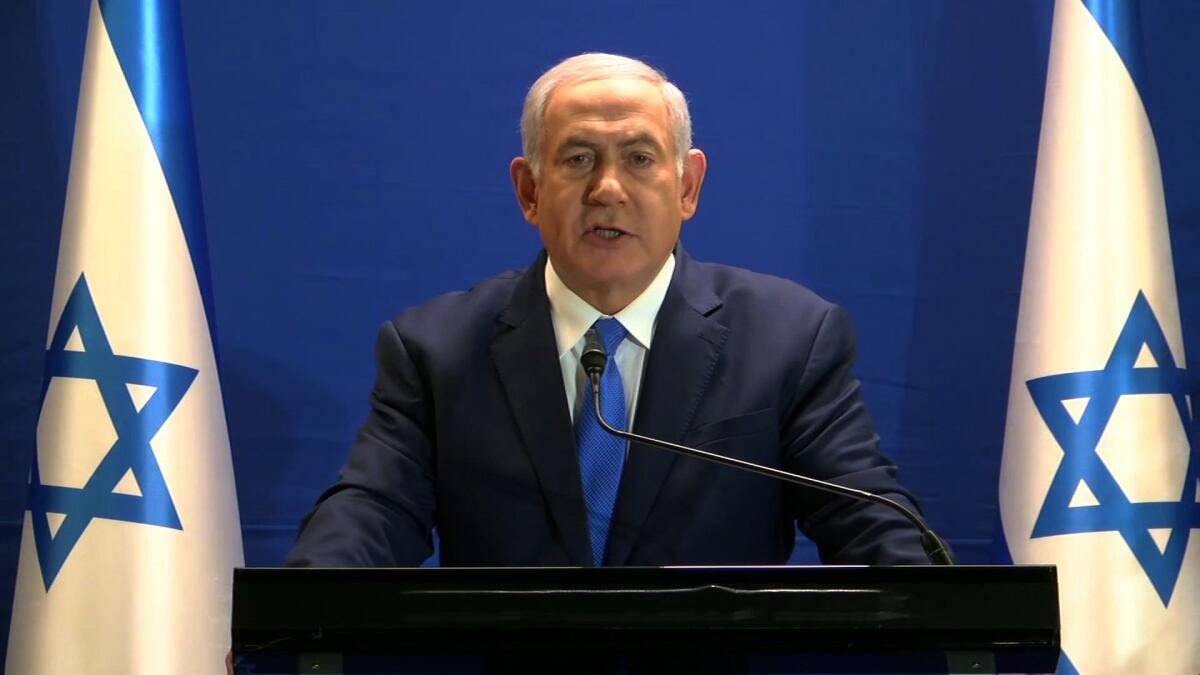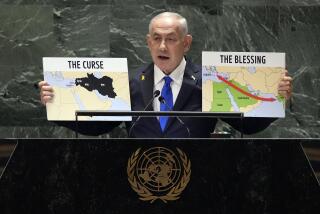Critics pan Israeli Prime Minister Benjamin Netanyahu’s ‘dramatic address’

Reporting from Jerusalem — On Monday afternoon, Israelis were mystified by an announcement from the office of Israeli Prime Minister Benjamin Netanyahu: At 8 p.m., the prime minister would deliver a “dramatic address to the nation.”
About what? The announcement didn’t say.
Netanyahu’s Likud Party leaked tantalizing hints of “new revelations regarding the investigations against the prime minister” as the clock ticked toward the appointed hour. The Israeli leader is under multiple corruption investigations, and both the police and the state attorney have called for his indictment.
However, the speech, when it came, revealed nothing more dramatic than a jittery Netanyahu decrying the injustice of his predicament.
“Even a prime minister has the right to due process,” he protested, while repeatedly charging that his demand for a confrontation with former associates who have turned state’s witness — “on live broadcast, if need be” — had been denied.
These are perilous times for Netanyahu, who has said he will not resign even if he is indicted. But last month, facing the collapse of his governing coalition, he dissolved the government and announced new elections for April 9. Meanwhile, he has suffered a setback on the international stage with President Trump’s announcement that the United States will be pulling out of Syria, potentially ceding influence in that country to Israel’s most threatening regional foe, Iran.
Netanyahu has staked much of his reputation on his close relationship with Trump, often referring to him as “the best friend Israel has ever had.”
Looming over all his political difficulties are his legal woes: two investigations delving into his alleged attempts to manipulate news outlets in his favor and a third investigation into an alleged deal exchanging political favors for lavish gifts from benefactors.
Legal analysts assailed Netanyahu’s assertion that he demanded to confront his accusers, pointing out that criminal suspects in Israel do not have the right to demand pretrial, in-person sessions with witnesses for the prosecution.
Referring to one of the investigations, in which he is accused of offering the publisher of a popular tabloid a deal involving positive coverage of Netanyahu in exchange for the suppression of the paper’s chief competitor, the prime minister referred to himself as “the most maligned figure in Israeli media.”
“This is a joke,” he said, arguing that “for the first time in history, positive media coverage” was being equated with bribery.
The prime minister did not reveal any new facts relating to the investigations into his conduct. One Israeli broadcaster, Channel 10, cut away from the speech before it ended; a left-leaning newspaper, Haaretz, published an analysis afterward arguing that the conservative prime minister should be barred from making live broadcasts on Israeli TV in the future.
And those were relatively mild critiques. On Kan News, Israel’s national public broadcaster, veteran political analyst Motti Gilat said of Netanyahu’s appearance: “I can’t remember such a cynical thing in a lifetime of politics.” Recalling the promise of a “dramatic” address, Gilat summed up the prime minister’s appearance thusly: “No drama, no semi-drama, not even a kissing cousin of drama.”
Labor Party leader Avi Gabbay, who is running to unseat Netanyahu, said in a statement that “in a normal country, a prime minister does not behave this way. In a normal country, the prime minister does not attack the law enforcement authorities.”
With his own ministers competing against one another to replace him, few voices spoke up to support Netanyahu.
One who did, Culture Minister Miri Regev, a close ally, issued a statement saying, “It is not every day you hear about the subject of an interrogation who wants to hold a confrontation with a state’s witnesses and is denied.” She added that she believed in Netanyahu’s innocence.
In a statement rejecting Netanyahu’s claims, the Justice Ministry said that all investigations into Netanyahu’s alleged malfeasance had been handled “professionally and thoroughly.”
Late into the night after Netanyahu’s TV appearance, his official Instagram account was being updated to support his principal argument — that corruption and bribery are the same, and if he didn’t accept cash gifts, he could not be guilty of bribery. Legal analysts have rebutted that argument, saying that the two crimes are distinct.
The Instagram account included a dizzying array of images with slogans such as “Bribery absent money is an omelette without eggs.”
Tarnopolsky is a special correspondent.
More to Read
Sign up for Essential California
The most important California stories and recommendations in your inbox every morning.
You may occasionally receive promotional content from the Los Angeles Times.










